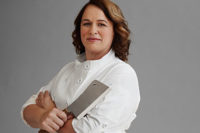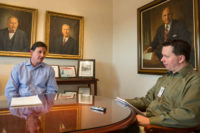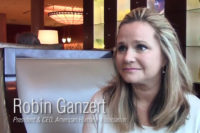Industry Advocacy
Tales of dirt and drive: A Q&A with Trent Loos
Trent Loos is host of “Loos Tales,” a broadcast show that profiles the ranchers and farmers of rural America.

Trent Loos, host of “Loos Tales,” a broadcast show that profiles the ranchers and farmers of rural America

Trent Loos has spoken in about 48 states, five Canadian provinces and Australia as well as Ireland.




Whether you are driving in New York City rush hour traffic or on your tractor in Nebraska, Loos Tales should be your new choice of radio for your morning commute. Trent Loos, an agriculture advocate, is the voice of rural America. Passionate and knowledgeable about ranchers, animals and the environment, Loos speaks for the industry, all in support of farmers and ranchers who work hardest to ensure the future of American food. What follows is a Q&A with Loos.
Strassburger: What is your background, specifically in the agriculture industry?
Loos: I am sixth-generation farmer who grew up near Quincy, Ill. My father still farms the same land that the first Loos farmed when [the family] arrived from Germany in 1832. Despite the family heritage on the home farm, I left Illinois in 1988. Kelli and I have been married for 24 years and currently raise cattle, hogs and horses in central Nebraska near where Kelli’s fifth-generation farm is located.
Strassburger: What inspired you to start this radio show?
Loos: In 2000, I heard a speech by a Hollywood schmuck about how and why we need to chase animal agriculture from United States soil. For years, both Kelli and I had talked about how we need to tell the public where their food actually comes from. That was the moment that I decided we needed to quit talking about it and start doing it.
About a week later, I walked into Jim Thompson’s radio studio. He had been in the radio business for 30 years, and I told him I wanted my own show. His response was, “You and every other American.”
But he soon realized that I was very serious and he became my mentor. Today I produce six different radio programs that are on the air in 21 states on 100 radio stations with a daily audience of about 3 million, including the Web audience.
Strassburger: What overall message are you trying to send with your show?
Loos: Very simply, I want to make sure consumers are making decisions based upon the facts about how and who is producing their food, not based on rhetoric spewed by people selling fear. The real answer has been to focus on the people who actually get their hands dirty taking care of land and livestock in order to generate the most efficient supply of food of any nation in the world.
For example, in 1900, it required five acres of land to produce enough food to feed one person for an entire year. In 2016, it will take less than one-third of acre to do the same. That is thanks to technology and hard work, plus the fortitude of the American farmer/rancher. My goal has always been to put the focus on those individuals who have made it happen.
Strassburger: Do you have an interview that was particularly memorable? Who was it with, and why was it so memorable?
Loos: In May 2014, I was driving through Salt Lake City, when I pulled into a truck stop to fuel up. Two young ladies were sitting on the tailgate of a pickup playing a ukulele for tips. I knew right away this would be a good radio show, so I offered to fill up their compact car in exchange for an interview. They left [their home] without a dime. They were collecting money for gas, but food was no issue. They were finding all the good food they needed in trash cans and Dumpsters.
“You would be surprised how much good stuff people throw away,” they told me. It truly was one of the conversations that reminded me how much we take for granted in this land of plenty. The American food system has come so far that this sounds barbaric, but it really wasn’t that long ago that many folks relied on such bartering for subsistence living; however, food waste was nonexistent in those days.
Strassburger: How do you choose your interviewees?
Loos: Interviews are usually spurred by one statement. Frequently I will be talking to someone and they say something that causes me to reach for my right vest pocket and get the recorder out. I do some radio interviews over the phone, but for the most part the best ones happen on the spur of the moment, anywhere and at any time.
Strassburger: What is a cause you are passionate about? How do you bring this passion into your show?
Loos: I am passionate about the core family values that drive the majority of the farm/ranch families in this country. Technologies will always come and go but the people that make it happen are what set the whole system apart. I love telling stories like that, of the Jorgenson family from Ideal, S.D., where four generations are working side by side to convert their God-given natural resources into the essentials of life.
Strassburger: What have you viewed as the biggest reward coming out of this show?
Loos: Without question it is the people I have met that are now friends from around the world. I have spoken in about 48 states, five Canadian provinces and Australia as well as Ireland. It has been very interesting to learn that, regardless of your address, the challenges and values of rural people are the same around the world. NP
Looking for a reprint of this article?
From high-res PDFs to custom plaques, order your copy today!










